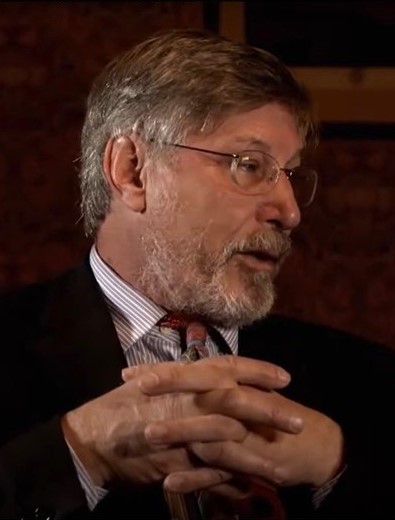
San Quentin residents and James Fox, Director of the Prison Yoga Project, hosted renowned therapist and author Dr. Bessel van der Kolk to discuss trauma-informed rehabilitation.
Dr. van der Kolk took the stage as residents piled into Chapel B, some carrying a copy of the author’s book, “The Body Keeps the Score.”
The goal of the visit was to engage with residents and staff involved in such programs.
The discussion offered evidence-based rehabilitation practices and trauma-responsive techniques.
“I have not stopped talking about [this prison] because there is something special here,” said Dr. van der Kolk. “It is something that you guys are doing together that is amazing.”
The first time Dr. van der Kolk visited the facility was to experience the prison’s yoga program. This visit, Dr. van der Kolk addressed residents of the Peer Support program who sought techniques for holding open and vulnerable discussions within the prison community.
Resident Jason Jackson talked about an incident at another prison where a person’s face was shot off. He asked why we, as humans, share traumatic experiences like a commonplace baseball game.
Dr. van der Kolk said the three main vehicles for healing are understanding co-regulation, mastering your own body, and learned helplessness.
These vehicles are how people reconnect with others in order to make sense of a traumatic experience, also called Top Down Interaction.
“When you are bombarded with trauma, your whole brain gets used to feeling bombarded,” van der Kolk said.
One resident asked about methods and techniques used to close a person back down after sharing a vulnerable session.
“People try to shut it down and if you open it up carelessly, someone can get retraumatized,” van der Kolk said.
Dr. van der Kolk offered residents suggestions on how to close up a person after sharing their vulnerability in a safe space.
“Many cultures have their own way of doing it. Two that come to mind right now are music, which I’m disappointed how little music has been used to deal with trauma, and sitting together because we are naturally social creatures and we need each other to calm ourselves,” said van der Kolk. He said that we are social creatures who rely on each other and that is one reason why solitary confinement is so counterproductive.
Lisa Scott traveled with Dr. van der Kolk and talked about co-regulation within trauma-informed programs. She said the most important part of the process is slowing it down.
Scott also recommended that peer support members, when sitting with clients, discuss breathing exercises and humming techniques.
“When you are with someone who is having trouble opening up, you need to recognize what you are going through in your body,” said Scott. “The more present that you can stay, the more it will shift.”